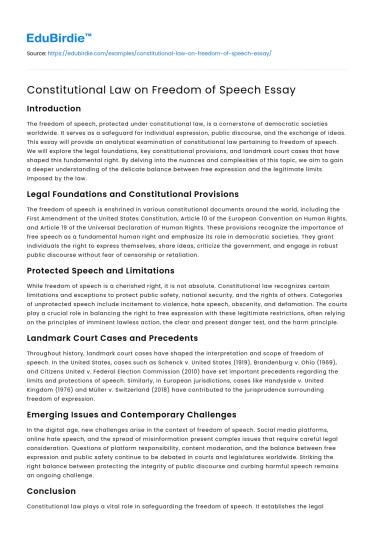Introduction
The freedom of speech, protected under constitutional law, is a cornerstone of democratic societies worldwide. It serves as a safeguard for individual expression, public discourse, and the exchange of ideas. This essay will provide an analytical examination of constitutional law pertaining to freedom of speech. We will explore the legal foundations, key constitutional provisions, and landmark court cases that have shaped this fundamental right. By delving into the nuances and complexities of this topic, we aim to gain a deeper understanding of the delicate balance between free expression and the legitimate limits imposed by the law.
Legal Foundations and Constitutional Provisions
The freedom of speech is enshrined in various constitutional documents around the world, including the First Amendment of the United States Constitution, Article 10 of the European Convention on Human Rights, and Article 19 of the Universal Declaration of Human Rights. These provisions recognize the importance of free speech as a fundamental human right and emphasize its role in democratic societies. They grant individuals the right to express themselves, share ideas, criticize the government, and engage in robust public discourse without fear of censorship or retaliation.
Save your time!
We can take care of your essay
- Proper editing and formatting
- Free revision, title page, and bibliography
- Flexible prices and money-back guarantee
Protected Speech and Limitations
While freedom of speech is a cherished right, it is not absolute. Constitutional law recognizes certain limitations and exceptions to protect public safety, national security, and the rights of others. Categories of unprotected speech include incitement to violence, hate speech, obscenity, and defamation. The courts play a crucial role in balancing the right to free expression with these legitimate restrictions, often relying on the principles of imminent lawless action, the clear and present danger test, and the harm principle.
Landmark Court Cases and Precedents
Throughout history, landmark court cases have shaped the interpretation and scope of freedom of speech. In the United States, cases such as Schenck v. United States (1919), Brandenburg v. Ohio (1969), and Citizens United v. Federal Election Commission (2010) have set important precedents regarding the limits and protections of speech. Similarly, in European jurisdictions, cases like Handyside v. United Kingdom (1976) and Müller v. Switzerland (2018) have contributed to the jurisprudence surrounding freedom of expression.
Emerging Issues and Contemporary Challenges
In the digital age, new challenges arise in the context of freedom of speech. Social media platforms, online hate speech, and the spread of misinformation present complex issues that require careful legal consideration. Questions of platform responsibility, content moderation, and the balance between free expression and public safety continue to be debated in courts and legislatures worldwide. Striking the right balance between protecting the integrity of public discourse and curbing harmful speech remains an ongoing challenge.
Conclusion
Constitutional law plays a vital role in safeguarding the freedom of speech. It establishes the legal framework that protects individuals' right to express their thoughts and opinions freely. However, it also recognizes the need for reasonable limitations to maintain public order, protect vulnerable groups, and ensure the functioning of a democratic society. As society evolves and new challenges emerge, the interpretation and application of constitutional law pertaining to freedom of speech will continue to shape the boundaries of this fundamental right. Through an ongoing dialogue, legal analysis, and a commitment to democratic values, we can navigate the complexities and preserve the delicate balance between free expression and responsible governance.
Did you like this example?
Make sure you submit a unique essay
Our writers will provide you with an essay sample written from scratch: any topic, any deadline, any instructions.
Cite this paper
-
APA
-
MLA
-
Harvard
-
Vancouver
Constitutional Law on Freedom of Speech Essay.
(2023, September 07). Edubirdie. Retrieved March 2, 2025, from https://edubirdie.com/examples/constitutional-law-on-freedom-of-speech-essay/
“Constitutional Law on Freedom of Speech Essay.” Edubirdie, 07 Sept. 2023, edubirdie.com/examples/constitutional-law-on-freedom-of-speech-essay/
Constitutional Law on Freedom of Speech Essay. [online].
Available at: <https://edubirdie.com/examples/constitutional-law-on-freedom-of-speech-essay/> [Accessed 2 Mar. 2025].
Constitutional Law on Freedom of Speech Essay [Internet]. Edubirdie.
2023 Sept 07 [cited 2025 Mar 2].
Available from: https://edubirdie.com/examples/constitutional-law-on-freedom-of-speech-essay/
copy






 Stuck on your essay?
Stuck on your essay?

